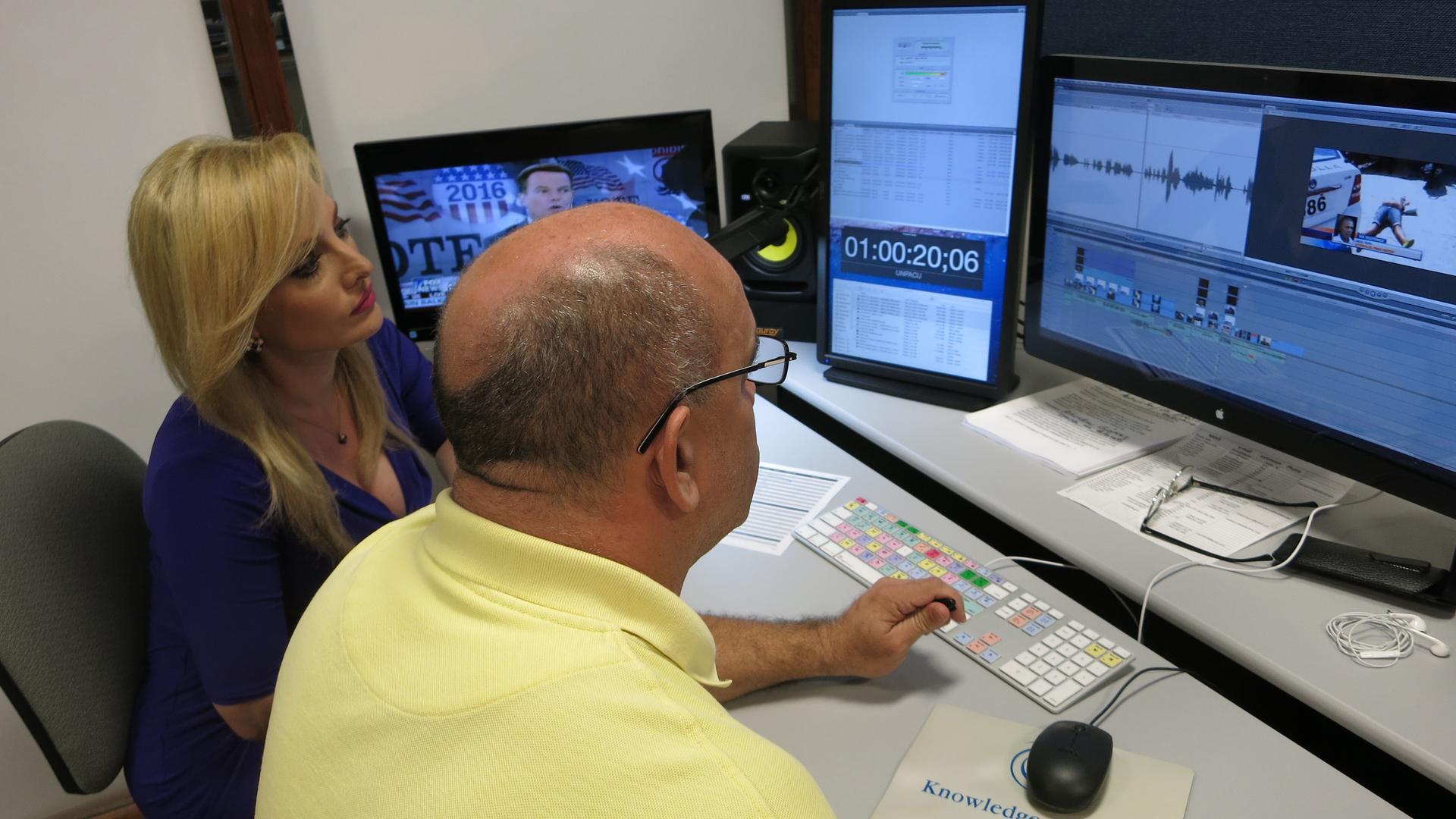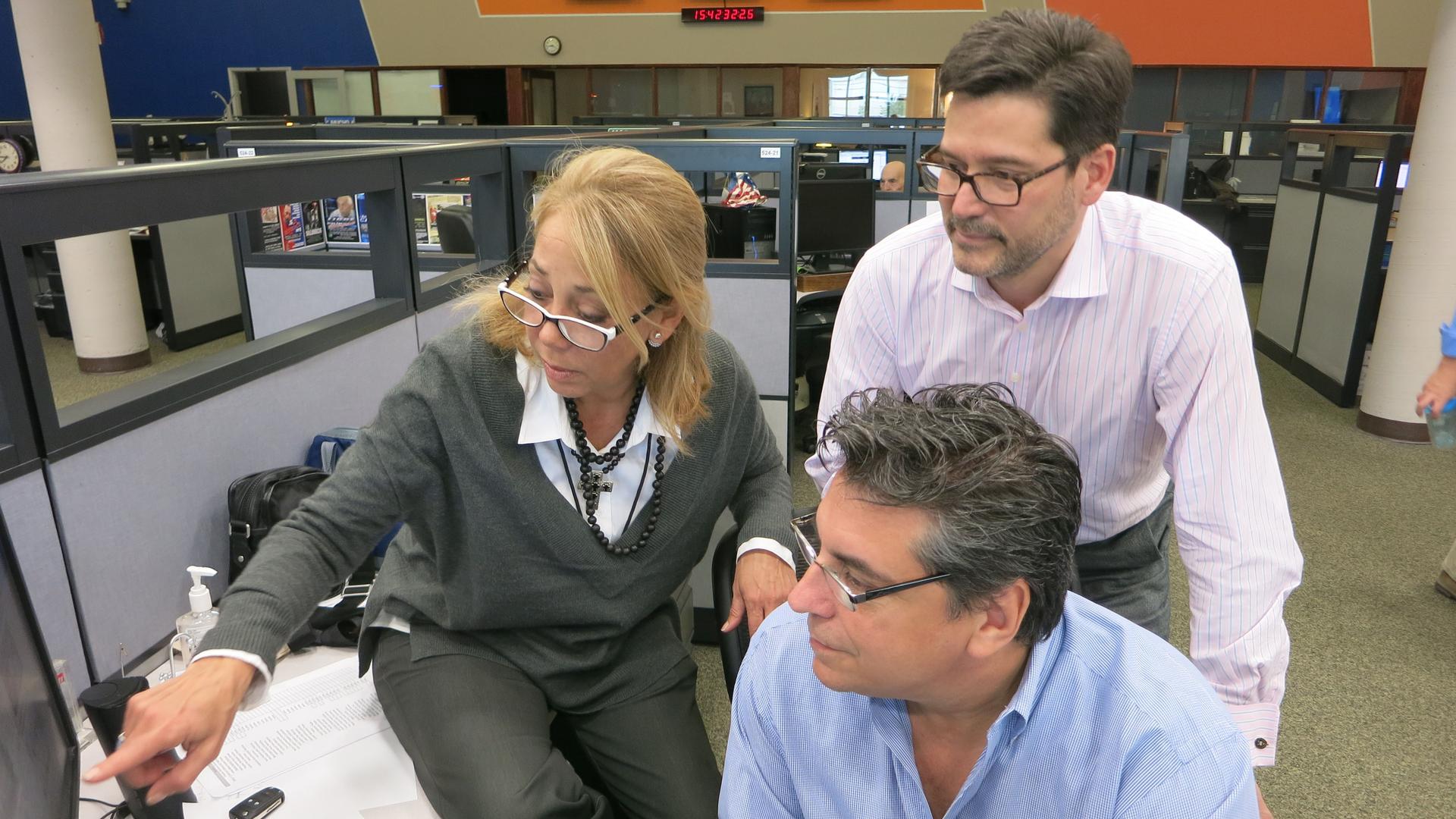With a thaw in US-Cuba relations, this Cold War broadcaster from Miami is at a crossroads
Malule González (left) and her team work on the news rundown in the Radio and TV Martí newsroom in Miami.
On first impression, Radio and TV Martí looks and feels pretty much like any other newsroom. Emilio Vazquez shows me around, and we stop and watch two radio broadcasters behind a thick pane of glass.
“We have a morning show known as ‘El Revoltillo,’ which is like an on-air swap market type of show, where people call in and offer different products and services for sale on island,” says Vazquez.
But here’s what’s different about this call-in show: It’s illegal for its listeners to call in, or even to listen. That is, if they even can — the Cuban government tries to jam broadcast signals coming from Florida. Vazquez said they’re always trying to stay one step ahead.
“We have various methods of transmission. We have medium-wave transmission on AM frequency, we have our short-wave transmissions as well.”
Those change frequencies throughout the course of the day.
Radio and TV Martí has been delivering news and information to Cuba since 1985, an intense period of the Cold War. The Cuban American National Foundation, a powerful lobbying group of Cuban exiles in Miami, helped persuade the Reagan Administration to create the stations, which fall under the Broadcasting Board of Governors, a US government agency.
Vazquez starts to tell me some other distribution tricks when we run into his boss, Malule González, the director of the Office of Cuba Broadcasting, the official name for Radio and TV Martí. On the way up to her office, we stop for shots of hyper-potent Cuban coffees.
In her office, González, who started her job in December 2015, tells me more about how their television content gets out in Cuba. On the island, vendors on the street sell what’s called “El Paquete,” thumb drives or DVDs with movies, music or videos.
“We have our own paquete. We create our own distribution of DVDs,” says González. “We have our ways, yeah. We have more ways than that one. But there are many things you don’t reveal because [the Cuban government] monitor everything that we do or say. I’m not going to give them all away. It’s just like the magician who never reveals the tricks, no?”

The Martís currently hand out about 16,000 paquetes a month, for free, in Cuba. González is confident their shows are being seen. But she has no way to prove it. Nobody does — there aren’t Nielsen ratings. The Casto regime, which reviles the Martís, has done everything to try and prevent its growth. Past surveys suggest the audience for the Martís is quite small, perhaps as low as 2 percent of the island.
But anecdotal evidence suggests otherwise.
Uva de Argaón is a retired professor who was also a commentator for about 15 years on Radio Martí. She told me about a time she got in a cab in Havana in the late 90s.
“This taxi driver was amazing because he heard me talk to my sister and he said, ‘Excuse me that I ask you, but do you talk in a radio show?’ And I said yes. And he said, ‘Do you talk on Radio Martí?’ And I said yes. He said, ‘Is your name Uva de Aragón?’ I almost … It was my second day in Havana after 40 years!”
That was a while ago though. It’s a much different world today in Cuba.
“Cuba is now able to access the Internet more freely then it did just a year ago. Telecommunications is penetrating Cuba much more quickly than people expected,” says Eduardo Gamarra, a professor of Latin American politics at Florida International University. “But it’s also true that Cubans still don’t have free access to global information.”
In fact, by some estimates only 5 percent of Cubans actually have access to the Internet.
Still, critics of the Martís question if Cubans are getting the best information from the government news agency. They call the programming one-dimensional, conservative and a mouthpiece of American policy. Gamarra says he’s staunchly disagreed with many editorials broadcast by the Martís over the years.
“But I think the criticism of them, that because they’re conservative, they’re not good journalists, doesn’t follow. They still have some value,” says Gamarra. “I think [the Martís] has an expiration date though.”

When that expiration date should be is the big question. With a thaw in US-Cuba relations, some say the time is now. Democratic Congresswoman Betty McCollum of Minnesota introduced a bill to end the Martís. It’s called the: “Stop Wasting Taxpayer Money on Cuba Broadcasting Act.” The Martís cost US taxpayers $27 million a year.
President Barck Obama wants to turn the Martís into an independent non-profit, but still funded by the government. It would be called a “grantee.”
Many conservatives say that would weaken the government’s commitment, and that the Martís still provide an invaluable service exposing human rights abuses in Cuba.
Malule González says her operation is more important than ever, even with President Obama on the island today.
“Don’t be confused by people shaking hands, that doesn’t mean that the Cuban people have any freedom,” says González.
To stay relevant, the Martís are also undergoing a transformation. To cover the president’s visit to Cuba, they’re using a small group of Cuban citizen journalists, secretly sending reports from Cuba to Miami. Their stories are then beamed back to the island.
González is also working with commercial news organizations, sharing content produced by the Martís for distribution in the US.
But she says if the day comes when Radio and TV Martí are in fact no longer needed as a news source for Cubans, still a distant if, she’ll be happy to shut things down.
“So, if we’re out of a job, well, then I’ll call you and send my résumé,” says González jokingly. “Out of a job, but celebrating.”
Every day, reporters and producers at The World are hard at work bringing you human-centered news from across the globe. But we can’t do it without you. We need your support to ensure we can continue this work for another year.
Make a gift today, and you’ll help us unlock a matching gift of $67,000!
